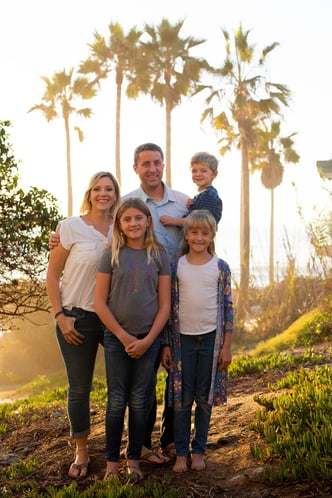When most prospective resource parents are considering fostering an infant or toddler, they worry they’ll become so attached that saying goodbye will be heartbreaking. But growing attached is the best part of fostering, Kim and David say. The Fallbrook couple is currently providing temporary care for 8-week-old “Lily,” their second placement with Angels. “Michael,” a toddler who spent 10 months with Kim, David, and their three children, recently reunified with his mother.
 They grew attached to the children in their care, and also feel connected to the children’s families as well. In fact, they watch Michael once a week while his mother is in class, and text frequently. “We’ve become good friends,” says Kim. “I’m so glad that so many resources are there because she used them all and took all the steps she needed to regain custody of her son.” The parents of both children have appreciated the couple for providing them with the time needed to get their lives on track. At the onset of both placements, Kim and David explained to each mother that they were not going to take away their baby. “We made it clear that we will support them as best we can to do what they need to get their children back,” says Kim.
They grew attached to the children in their care, and also feel connected to the children’s families as well. In fact, they watch Michael once a week while his mother is in class, and text frequently. “We’ve become good friends,” says Kim. “I’m so glad that so many resources are there because she used them all and took all the steps she needed to regain custody of her son.” The parents of both children have appreciated the couple for providing them with the time needed to get their lives on track. At the onset of both placements, Kim and David explained to each mother that they were not going to take away their baby. “We made it clear that we will support them as best we can to do what they need to get their children back,” says Kim.
David says it was “eye-opening to see how much having someone in your corner can make a difference." He first learned this as a Court Appointed Special Advocate for abused and neglected children, a volunteer position he held for 18 months. "When you hear about children being pulled away from their families, you get a sick-to-your-stomach feeling realizing that this is real life.”
Kim and David discussed the idea of fostering with their daughters Lydia, 11, and Layla, 9. Their son James is 3 years old. “The girls were all in,” David says. They say fostering has helped their children see the potential in people. “They know that good people can make bad choices and they still deserve love, respect, and help,” Kim says.
Fostering wasn’t all smooth sailing, though. The couple had to learn to care for babies who were born prematurely; both of their foster placements had spent time as newborns in a hospital Neonatal Intensive Care Unit. They also had no experience with bottle feeding.
They learned that with fostering, many things are completely out of the control of resource parents. “But we can control the time we give them,” says Kim. “It’s great to know the children were a priority in our lives and that they will be able to form healthy attachments better now.”
Kim and David did become attached to the children in their care. But they see that as a positive thing. “That’s what these kids need,” says Kim. “Your attachment could be what saves a child.”



